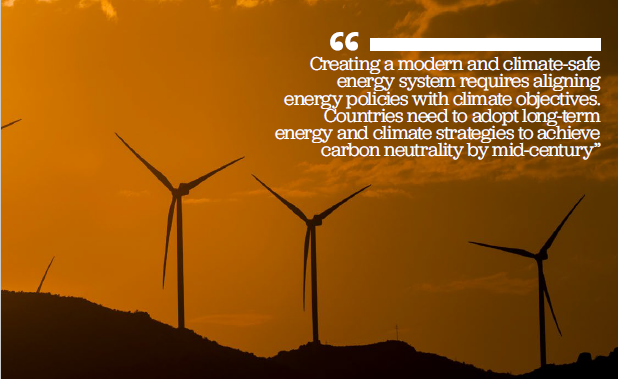The race for renewables
Francesco La Camera, director-general of the International Renewable Energy Agency explains why action to implement renewable energy infrastructure will be key to mitigating the climate crisis
The global energy transformation is happening, driven by the dual imperatives of mitigating climate change and achieving sustainable growth. Renewable energy is driving this transformation, as a result of increasing cost-competitiveness, enabling policies and innovative technologies. But if we are to meet the targets of the Paris Agreement, we need to further accelerate our path. Energy-related carbon dioxide emissions continue to rise, the available carbon budget to stay under the 1.5°C target reduces rapidly, so there is a pressing urgency for collective action. The G20 members play a key role in this regard.
The International Renewable Energy Agency’s 2019 Global Energy Transformation: Roadmap 2050 highlights that electrification of energy production, fed by renewables, is the major climate solution. When coupled with deep electrification of end-use sectors such as transport and heating, renewables can deliver more than 75% of the required energy-related emission reductions. Combined with improved energy efficiency, these emissions could even be reduced by 90%.
Our analysis shows that by 2050, electricity would become the main energy carrier, covering almost half of the final energy consumed. It also estimates that renewable power will be able to deliver 86% of the global electricity demand. This would require integrating higher shares of variable renewable energy in the power system. To this end, IRENA’s Innovation Landscape Report outlines solutions in enabling technologies, business models, market design and system operations, and how these can ensure grid flexibility with higher shares of variable renewable energy.
For instance, hydrogen produced from renewable electricity may have the potential to integrate high levels of variable renewable energy into the energy system.
But the energy transition today is not just about replacing one source of energy with another. It entails an overall economic and industrial transformation. The deployment of renewable energy brings about significant socio-economic benefits: IRENA’s analysis finds that the energy transition will increase the global gross domestic product with a cumulative gain of $99 trillion between now and 2050. It would also create seven million new jobs. Due to falling renewable energy costs as well as opportunities to electrify transport and other end-use sectors, additional investment required for climate-safe energy transition would be 40% less compared to our previous analysis, decreasing from $27 billion to $15 billion by 2050. Although the overall investment needs to be scaled up significantly, the return is huge, given that every dollar spent would pay off up to seven times.
G20 members account for four-fifths of the global energy consumption and host around 81% of the world’s installed renewable power generation capacity. From this perspective, the G20 is well positioned to further strengthen global policy efforts to accelerate renewable energy deployment. IRENA has been closely cooperating with the G20 over the past years to feature renewable energy prominently in its deliberations. At the request of Japan’s G20 presidency, we have provided analysis on grid integration and power system flexibility. This is a key area of interest and several G20 members are operating with relatively large shares of renewables in their power systems: in 2018 renewables made up 33%, 38% and 40% of power generation capacity for the United Kingdom, China and Germany, respectively.
We also prepared an analysis for the G20’s Climate and Sustainability Working Group on how climate and renewable energy policies at the national level can promote distributed energy innovation and can empower local communities and households. Our knowledge products and analysis have provided substantive inputs to the renewable energy discussions at the G20. As the global voice of renewables, IRENA will undertake a more action-oriented role to become the arm of renewable energy too. To this end, IRENA will further strengthen its collaboration with the G20 to support implementation of targeted policy measures in the aforementioned areas.
Creating a modern and climate-safe energy system requires aligning energy policies with climate objectives. Countries need to adopt long-term energy and climate strategies to achieve carbon neutrality by mid-century. An important part of this is the increase of renewable energy ambitions in the next round of nationally determined contributions under the Paris Agreement.
As we prepare to take stock of their implementation in 2020 and approach the deadline for countries to raise their ambitions at the 25th Conference of the Parties to the United Nations Framework Convention on Climate Change in Santiago, Chile, in December 2019, the Osaka Summit presents a crucial opportunity for all G20 members to take action and demonstrate global leadership.












